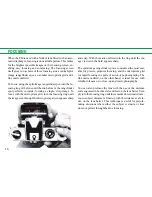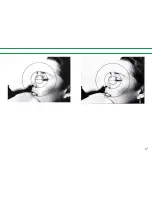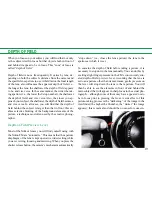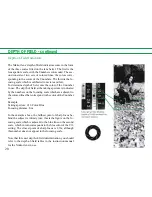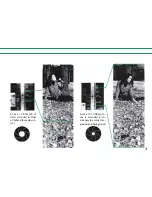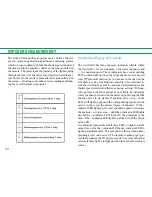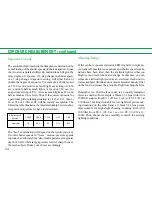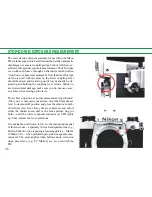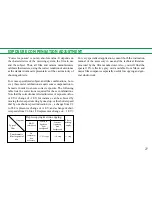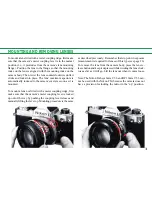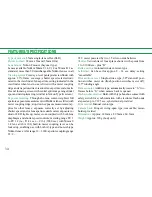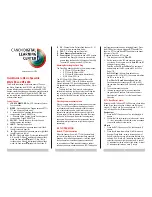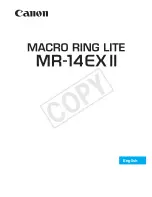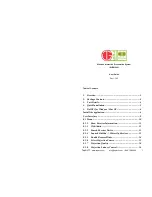
30
TIPS ON CAMERA CARE
Tough and durable though your Nikon FM is, it is a preci-
sion optical instrument, and careless or rough handling can
cause irreparable damage. Observe the following tips, and
the camera will always work as perfectly as the day you
bought it.
•
Remember that the camera’s controls are designed to oper-
ate with a minimum of pressure. If you find yourself exert-
ing extra force, take it as a warning that you’re doing some-
thing wrong.
•
Keep all lens and prism surfaces free from dust, dirt and
fingerprints. These not only impair viewing—they also gen-
erally result in a deterioration of optical performance. Clean
such surfaces either with a blower-type brush or with lens
tissue moistened with absolute alcohol. Never use lens tis-
sue dry—it will scratch the lens. In general, avoid using clean-
ing fluids and lens tissue containing silicone (i.e., eyeglass
tissue).
•
When loading or unloading film, ensure that the interior of
the camera body is free of dust, grit or chips of film. Use a
blower brush to remove such foreign articles. Avoid touch-
ing all internal surfaces, particularly the shutter mechanism
and film pressure plate.
•
When mounting or removing lenses, prevent the entry of
foreign matter, and take extra care not to damage the rear
por” tion of the lens. Use a blower-type brush to do your
cleaning.
•
Use the cleaning cloth to clean the external surfaces of the
camera body.
•
If condensation should form on the lens surfaces (i.e., when
the camera is exposed to sudden temperature changes or to
high humidity), dry the camera thoroughly at room tempera-
ture without using anything before storing it in a cool, dry
place.
•
Should you drop the camera accidentally on the floor or in
water, take it to an authorized Nikon dealer or service facility
for servicing immediately.
It is best to store the camera in a case or something similar
when you’re not using it. In this case, make sure the camera’s
shutter or self~timer is not cocked; also, don’t leave film in
the camera if it is to be stored for a long period of time.
Do not lubricate any part of the camera yourself; all such work
should be left to an authorized Nikon dealer or service facil-
ity. It is good practice to test your camera for proper operation
before preceding to your shooting assignment. Observe nor-
mal battery handling procedures to ensure your camera deliv-
ers maximum performance at all times: (1) Install batteries
correctly, (2) clean them periodically with a dry cloth; (3) re-
move batteries when the camera is stored for a long period of
time; (4) store unused batteries in a cool, dry place; (5) change
weak batteries promptly to prevent leakage within the cam-
era. Also; dispose of used batteries properly (i.e., they should
never be burnt), and keep them out of the reach of children.
For details on battery performance by brand, refer to the lit-
erature available from the manufacturer.

